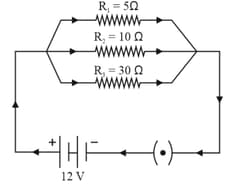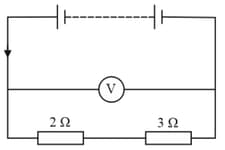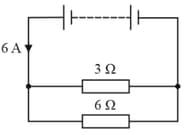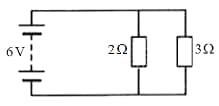Lakhmir Singh and Manjit Kaur Solutions for Chapter: Electricity, Exercise 22: Short Answer Type Questions
Lakhmir Singh Physics Solutions for Exercise - Lakhmir Singh and Manjit Kaur Solutions for Chapter: Electricity, Exercise 22: Short Answer Type Questions
Attempt the free practice questions on Chapter 1: Electricity, Exercise 22: Short Answer Type Questions with hints and solutions to strengthen your understanding. Science for Tenth Class Part - 1 Physics solutions are prepared by Experienced Embibe Experts.
Questions from Lakhmir Singh and Manjit Kaur Solutions for Chapter: Electricity, Exercise 22: Short Answer Type Questions with Hints & Solutions
In the circuit diagram given below, three resistors and of and respectively are connected as shown.

Calculate:
(a) current through each resistor.
(b) total current in the circuit.
(c) total resistance in the circuit.
A potential difference of is applied to two resistors of and connected in series. Calculate:
(a) the combined resistance
(b) the current flowing
(c) the potential difference across the resistor
A potential difference of is applied to two resistors of and connected in parallel. Calculate:
(a) the combined resistance
(b) the current flowing in the main circuit
(c) the current flowing in the resistor.
In the circuit shown below, the voltmeter reads .

(a) What is the combined resistance?
(b) What current flows?
(c) What is the potential difference across resistor?
(d) What is the potential difference across resistor?
In the circuit given below:

(a) What is the combined resistance?
(b) What is the potential difference across the combined resistance?
(c) What is the potential difference across the resistor?
(d) What is the current in the resistor?
(e) What is the current in the resistor?
A battery is connected to two resistors which are joined together in series.
(a) Draw a circuit diagram to represent this. Add an arrow to indicate the direction of conventional current flow in the circuit.
(b) What is the effective resistance of the two resistors?
(c) Calculate the current that flows from the battery.
(d) What is the potential difference across each resistor?
The figure given below shows an electric circuit in which current flows from a battery through two resistors.

(a) Are the resistors connected in series with each other or in parallel?
(b) For each resistor, state the p.d. across it.
(c) The current flowing from the battery is shared between the two resistors. Which resistor will have a bigger share of the current?
(d) Calculate the effective resistance of the two resistors.
(e) Calculate the current that flows from the battery.
A coil and a coil are connected in parallel. What is their combined resistance? If the total current of passes through the coils. What current passes through the coil?
